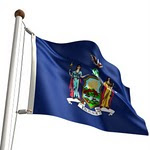University Law School alum and former United States Rep. Harold E. Ford, Jr. returned to campus yesterday to speak before a crowd of approximately 150 people about a variety of issues, including the economy, the primary voting system and the recently passed health care reform bill.
During his talk in the Ford School of Public Policy’s Annenberg Auditorium, Ford commended President Obama’s resiliency in passing health care reform, but was quick to point out that it should merely be viewed as a first step to a more comprehensive effort to expand health insurance in the country.
“My hope is that over the next few months that we view this moment as really just another starting point around health care, that the fixes that have to come, that some of the test runs in this health care bill will seek to determine the next steps,” Ford said.
Ford, who is also the chairman of the Democratic Leadership Council, also praised the president for his recent decision to allow offshore drilling along the Atlantic coastline, the eastern Gulf of Mexico, and the north coast of Alaska.
“I think it shows maturity in politics when you can assess a situation one day and assess it another day, and understand that things have changed and require a different set of answers,” Ford said. “I applaud the president for recognizing that the moment today and the set of facts and circumstances require a different set of answers.”
Before he was elected, Obama vehemently opposed offshore drilling, saying it should not be depended on to solve the energy problems in the United States.
Once considered a viable candidate to run for a U.S. Senate seat in New York this fall, Ford dropped out of the race last month, citing pressure from the Democratic Party not to contest the spot currently held by Democratic Sen. Kirsten Gillibrand.
Ford, who served as congressman for Tennessee’s ninth congressional district from 1997 to 2007, cited potentially detrimental effects for the Democrats as a main reason for deciding not to pursue a bid for the Senate.
“If I run, the likely result would be a brutal and highly negative Democratic primary – a primary where the winner emerges weakened and the Republican strengthened,” Ford wrote in a March 1 op-ed piece in The New York Times. “I refuse to do anything that would help Republicans win a Senate seat in New York, and give the Senate majority to the Republicans.”
But this wasn’t the first time Ford made a play for a Senate seat. Ford ran for Senate in 2006 losing the election to Republican Bob Corker after Corker ran ads against Ford that many criticized as racially charged.
In his speech yesterday, Ford also promoted his desire for an open primary system, in which candidates would be allowed to run for office without having to declare themselves as Democrats or Republicans. He said that oftentimes those who do not affiliate with a party are unable to have their views heard because the majority of audiences tend towards columnists and talk show hosts who express opinions that are either extremely liberal or extremely conservative.
“There is no doubt that those people deserve a voice, but they shouldn’t drown out the rest of the country which I believe find themselves situated somewhere in the middle,” he said.
Ford also spoke directly to current Public Policy students, encouraging them not to be dissuaded by political agendas that have hampered government’s ability to provide meaningful change to its citizens.
“One of the challenges for this generation of public policy school graduates is to not be confined by, or not allow the current dogma or current conversation to limit your thinking about answers to big public policy problems confronting the nation,” Ford said.
Source: The Michigan Daily
skip to main |
skip to sidebar


More About Harold Ford Jr.
About
This is an unofficial blog supporting Harold Ford, Jr. and his vision for New York and America.
